Cookies for Dummies: a simple explanation of a complex topic
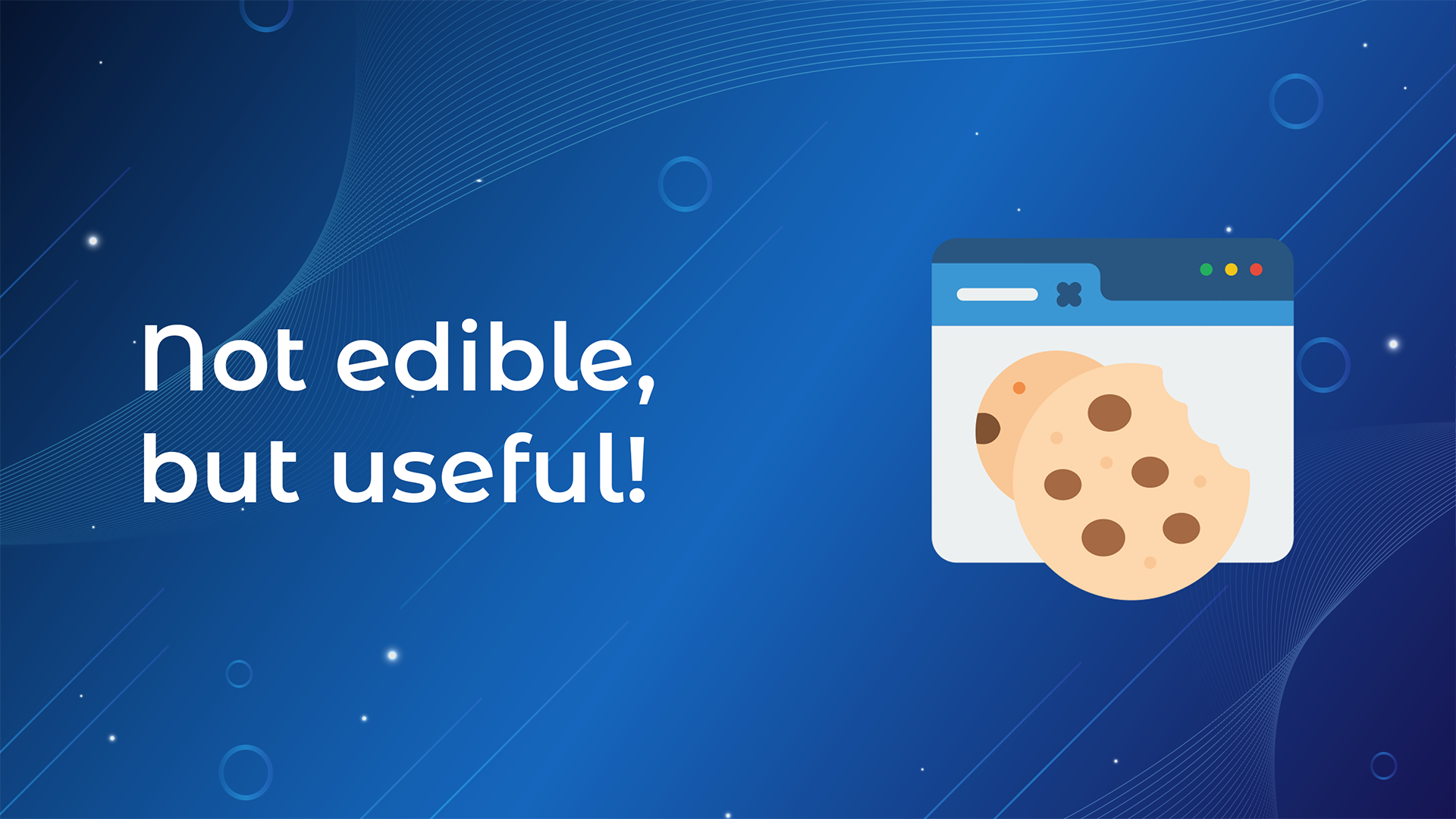
What are cookies?
When you visit a website and it «remembers» you — for example, automatically filling out the login form or showing you products you've recently viewed — it's not magic. Behind all this are little helpers called cookies.
Cookies are like your browser's notebook. They store tiny pieces of information that help websites work more conveniently and quickly. For example, if you are logged in to a website, cookies will remember your login so that you don't have to enter it again and again. Sounds great, right?
But let's be honest: many people have heard of cookies, but don't fully understand how they work and why they are needed at all. And sometimes they're even a little afraid of them, especially when they see a message like «This site uses cookies.» Don't worry — we'll take everything in order. In this article, I'll tell you how cookies make our online lives easier, what types of cookies are available, and how to manage them to feel safe.
How do cookies work?
Imagine going to a coffee shop where the barista knows your name and remembers your favorite drink. It creates a sense of comfort and saves time because you don't have to explain what you want every time. Cookies work in much the same way, only on the Internet.
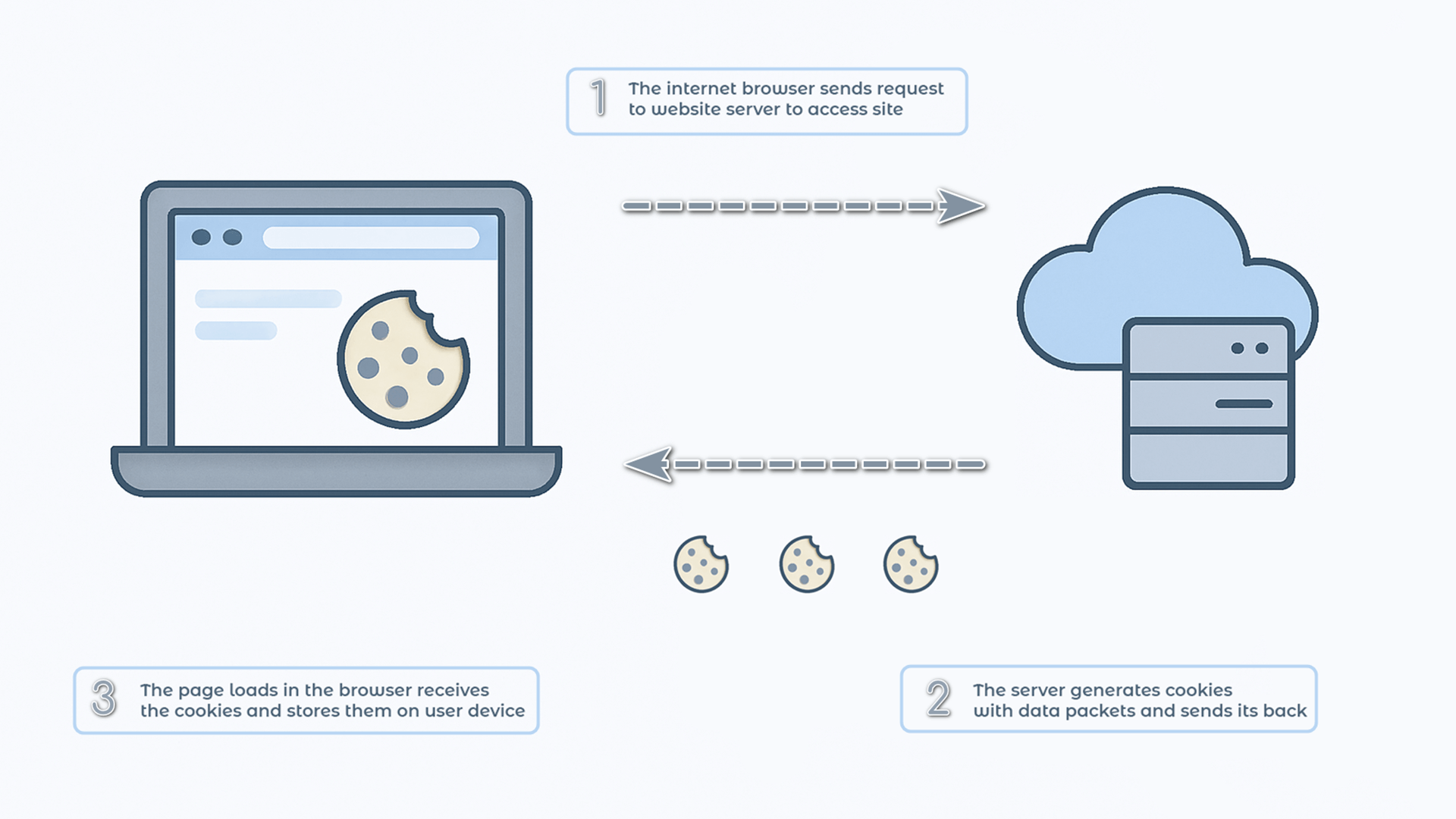
How cookies work: interaction between browser and server
When you visit a website, it may send a small text file called a cookie to your browser. This file is stored on your device (such as a computer or phone). When you visit the same site again, your browser sends the cookie back to the server. This allows the site to «recognize» you and offer a personalized experience.
For example:
- If you have added an item to your cart but have not completed the purchase, a cookie helps the site remember this item so that you can return to it later.
- If you have chosen an interface language, the cookie will save this choice so that you do not have to change it every time you visit.
Cookies can store various types of information, from your preferences to authorization data. But it's important to remember that they don't contain any personal information unless you provide it yourself. For example, if you have entered your name or email address, a cookie can store this with your permission.
Types of cookies
There are different types of cookies, and each type performs a different task. Let's take a look at what cookies are and how they differ.
| Cookie type | What is the role of |
|---|---|
| Session | These cookies work only during your session on the site — from login to logout. As soon as you close your browser, they disappear. For example, if you add items to your shopping cart but don't complete the purchase, session cookies will help keep your shopping cart open until you leave the site. It's like a temporary note that gets erased when you leave. |
| Persistent | Unlike session cookies, these cookies remain on your device even after you close the browser. They can be stored for weeks, months, or even years. Persistent cookies are used to remember your preferences, such as the interface language or design theme. Thanks to them, the site will always look the way you like it. |
| Third-party | These cookies are not set by the website you are visiting, but by other services. For example, if a website has a «Share» button on social media or an advertising banner, it may be related to third-party cookies. They are often used for analytics or to display personalized ads. However, such cookies raise the most questions from users because they are more difficult to control. |
| HTTP-only and Secure cookies | These are special types of cookies that provide security. HTTP-only cookies are protected from access via JavaScript, which reduces the risk of malicious attacks. Secure cookies are transmitted only over a secure HTTPS connection to protect your data from interception. |
Each of these types of cookies has its own purpose, and they make the Internet more convenient. But it's important to remember that you can always control them — we'll talk about that later.
What are cookies for?
Cookies are not just a technology that works behind the scenes. They play an important role in our everyday life online. Here are some reasons why they are so useful:
- Personalization of content
Imagine visiting a news site and it immediately shows you articles on topics that interest you. Or you visit an online store and it offers products you've recently looked at. It's all thanks to cookies! They help websites remember your preferences to make your experience as convenient as possible.
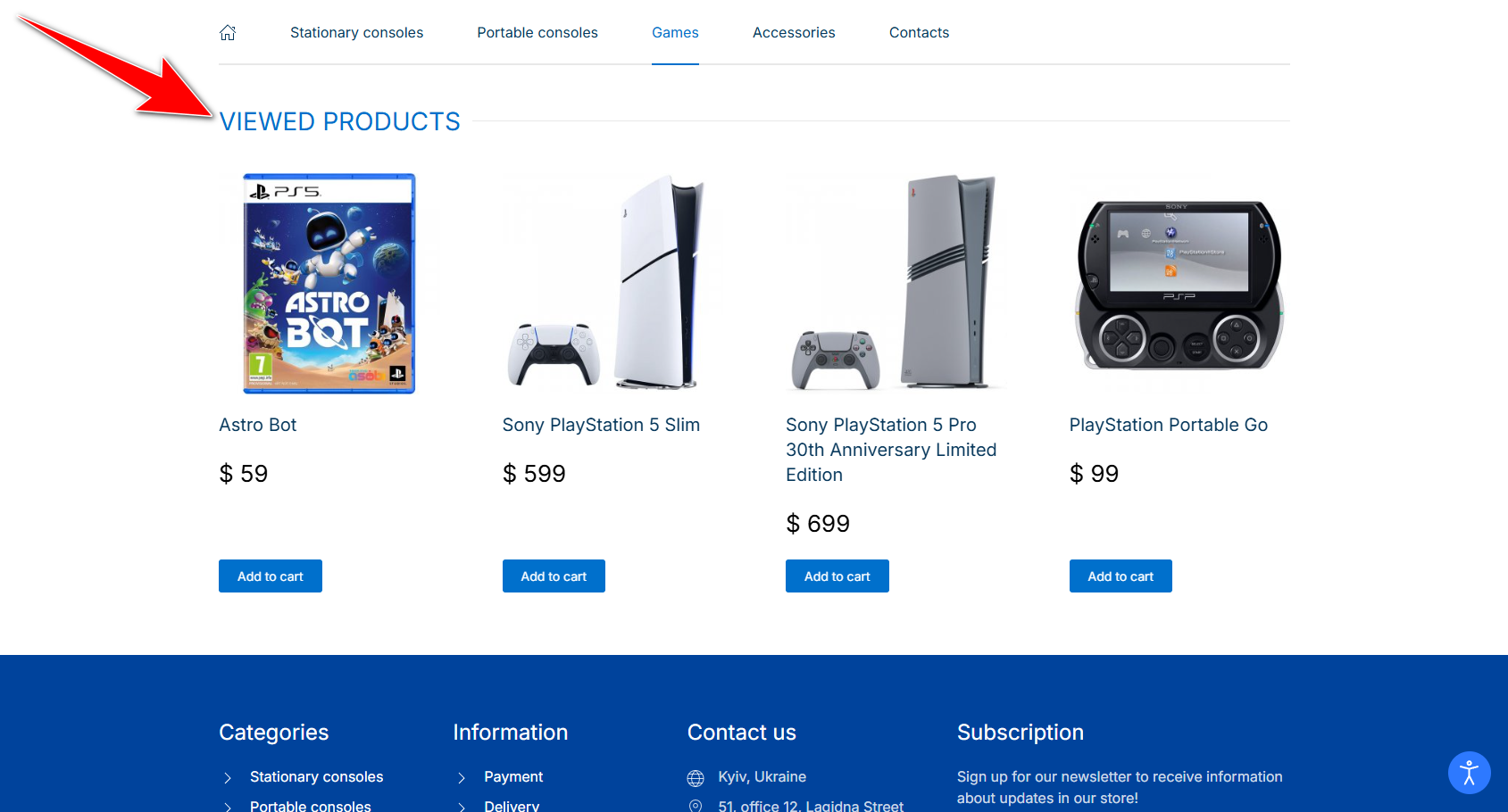
An example of how a cookie works: the site remembers the products you have viewed before
- Authorization and security
When you log in to a website, such as a social network or email service, cookies help it «remember» that you are already logged in. This way, you don't have to enter your username and password every time you open your browser. Without cookies, you would have to log in again every time you visit a website.
- Analyze user behavior
Websites often use cookies to analyze how users interact with their content. For example, how much time you spend on a page, what buttons you click, and what products you browse. This data helps website owners improve their sites, making them more convenient and interesting for you.
- Advertising and marketing
If you've noticed that online ads are becoming more relevant (for example, you see ads for products you've recently searched for), this is also the work of cookies. Third-party cookies help advertisers to show you ads that are relevant to you.
- Easy to use
For example, if you have chosen an interface language or display mode (light/dark theme), cookies will save this choice so that you do not have to configure it again. This makes working with websites more comfortable.
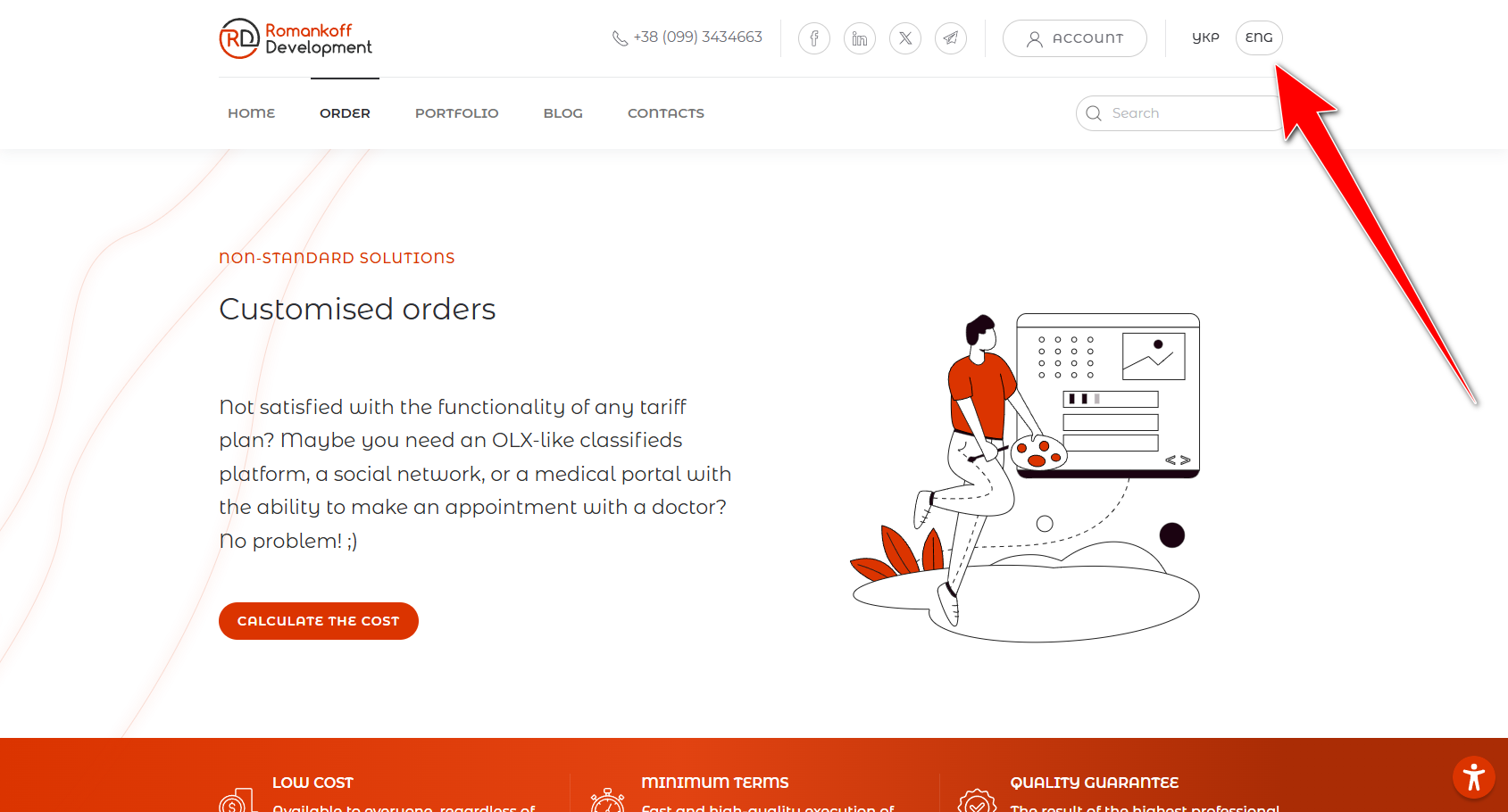
Screenshot of the Romankoff Development website with language selection: an example of using cookies to save user preferences
As you can see, cookies are not just a technical necessity, but real helpers that make our online life more convenient. However, it is important to remember that the use of cookies should be transparent and secure. We will discuss this in the following sections.
Advantages and disadvantages of cookies
Like any technology, cookies have their strengths and weaknesses. On the one hand, they make the Internet more convenient and functional. On the other hand, they sometimes raise questions, especially when it comes to privacy.
Advantages of cookies
- Convenience
Cookies make our lives online easier. For example, they remember your preferences, authorization data, and interface settings. Thanks to this, you don't have to set up the site again or enter your login every time.
- Personalization
Websites can adapt to you by offering content that is really interesting. It can be anything from news to products in an online store.
- Analytics
Website owners use cookies to analyze user behavior. This helps them improve their services, make them more convenient and functional.
- Security
Some cookies (for example, HTTP-only and Secure cookies) protect your data from being stolen or intercepted by intruders. They play an important role in ensuring the security of online services.
Disadvantages of cookies
- Privacy
Third-party cookies can collect information about your online activities without your explicit consent. This raises concerns about privacy and the use of data for advertising.
- Security risks
If cookies get into the hands of an attacker (for example, through an insecure connection), they can use them to access your accounts. That's why it's important to only use secure websites with HTTPS.
- Cluttering up the device
Over time, cookies can build up on your device, taking up space and slowing down your browser. While this rarely becomes a serious problem, regularly clearing cookies can help prevent this from happening..
- Abuse of advertising
Personalized ads are useful, but sometimes they can become too intrusive. For example, if you see the same ads all the time, it can be annoying.
As you can see, cookies are a tool with a double effect. They make the Internet more convenient, but they also require you to be careful about your privacy and security. In the next part, I'll show you how to manage cookies to minimize their disadvantages.
How to manage cookies?
1. Cookie settings in your browser
The good news is that you can always control cookies on your device. It's not as complicated as it may seem at first glance. Most modern browsers allow you to manage cookies right in the settings. You can allow or block them, as well as clear already stored files. Here's how to do it in popular browsers:
 Google Chrome
Google Chrome
Settings: Go to the menu (three dots in the upper right corner), select "Settings" → "Privacy and security" → "Cookies and other data". Here you can manage your settings.
How to delete cookies in Chrome: "Settings" → "Privacy and security" → "Clear browser data". Select what you want to delete (for example, cookies and cache).
 Mozilla Firefox
Mozilla Firefox
Settings: Open the menu (three bars), select "Settings" → "Privacy and security" → "Cookies and website data". Here you can configure which cookies are allowed.
How to clear cookies in Mozilla Firefox: "Settings" → "Privacy and security" → "Manage Data". Click "Remove All".
 Safari
Safari
Settings: In Safari go to "System Preferences" → "Privacy and security" → "Manage website data". Choose how you want to handle cookies.
How to remove cookies from Safari: Open Safari, go to "Safari" → "Settings" → "Privacy". Click "Manage site data" and delete cookies for specific sites or all at once.
Note Deleting or blocking cookies may cause websites to "forget" you. For example, you will have to log in again to your favorite platforms.
2. Check the privacy policy on the website
Many websites are now required to inform you about the cookies they use. When you see a pop-up window asking about cookies, you can choose which ones to allow. For example, you can disable analytical or advertising cookies, leaving only the necessary ones.
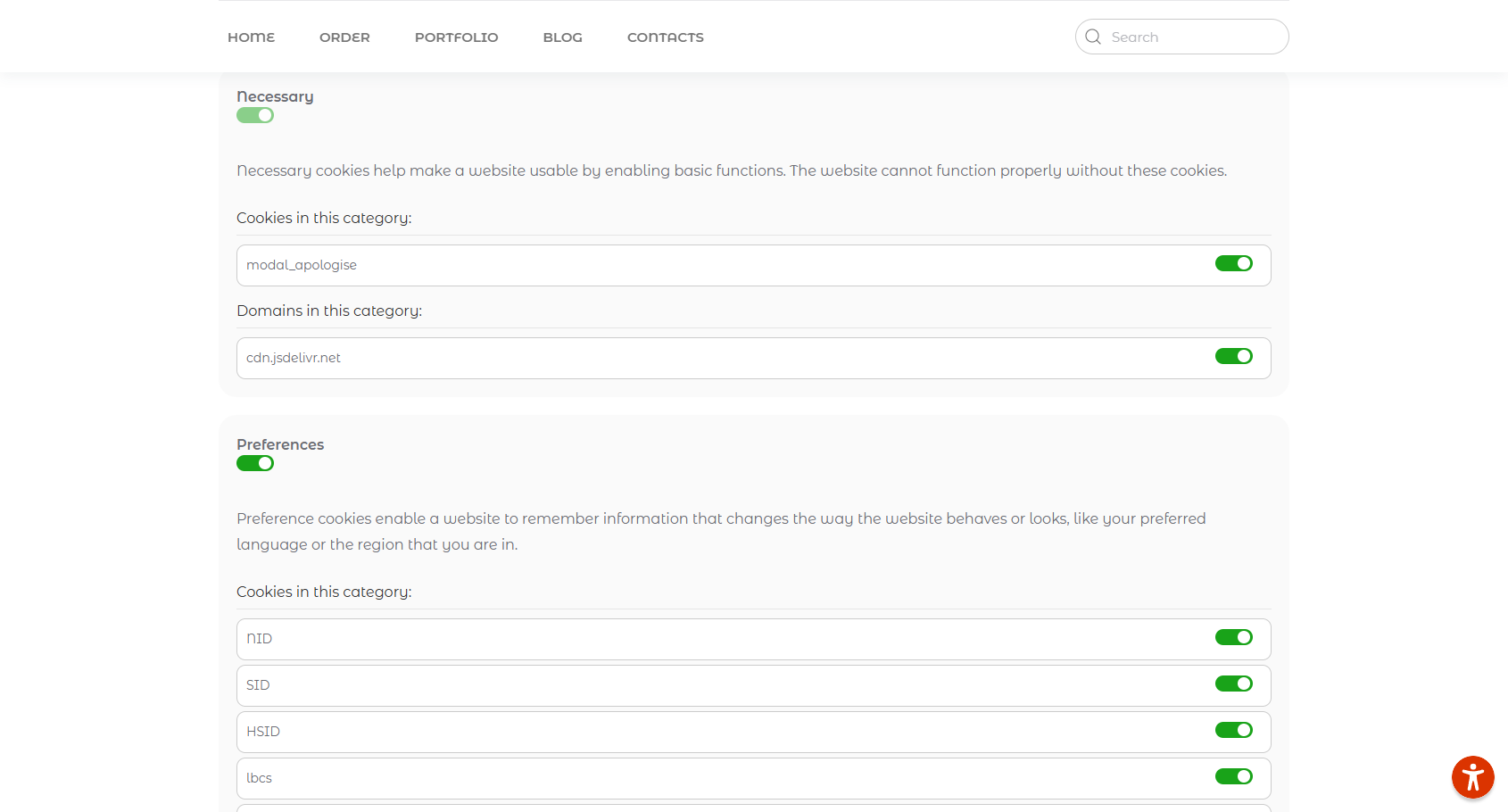
How to manage cookies: an example of setting up permissions on the Romankoff Development website
Managing cookies is an important step to protect your privacy and ensure your online experience. The key is to find a balance between convenience and security. If you follow these simple tips, you can control how websites interact with your device.
Cookies and law
As technology has evolved and the amount of data collected has increased, legislation in many countries has begun to pay more attention to protecting user privacy. Cookies are one of the key aspects of this topic, as they are often used to collect information about users. Let's take a look at what laws govern their use and what it means for you.
1. General Data Protection Regulation (GDPR)
If you've ever visited a website from the European Union, you've probably seen pop-ups asking you to accept cookies. This is due to the GDPR (General Data Protection Regulation), a strict law that regulates the processing of personal data in the EU.
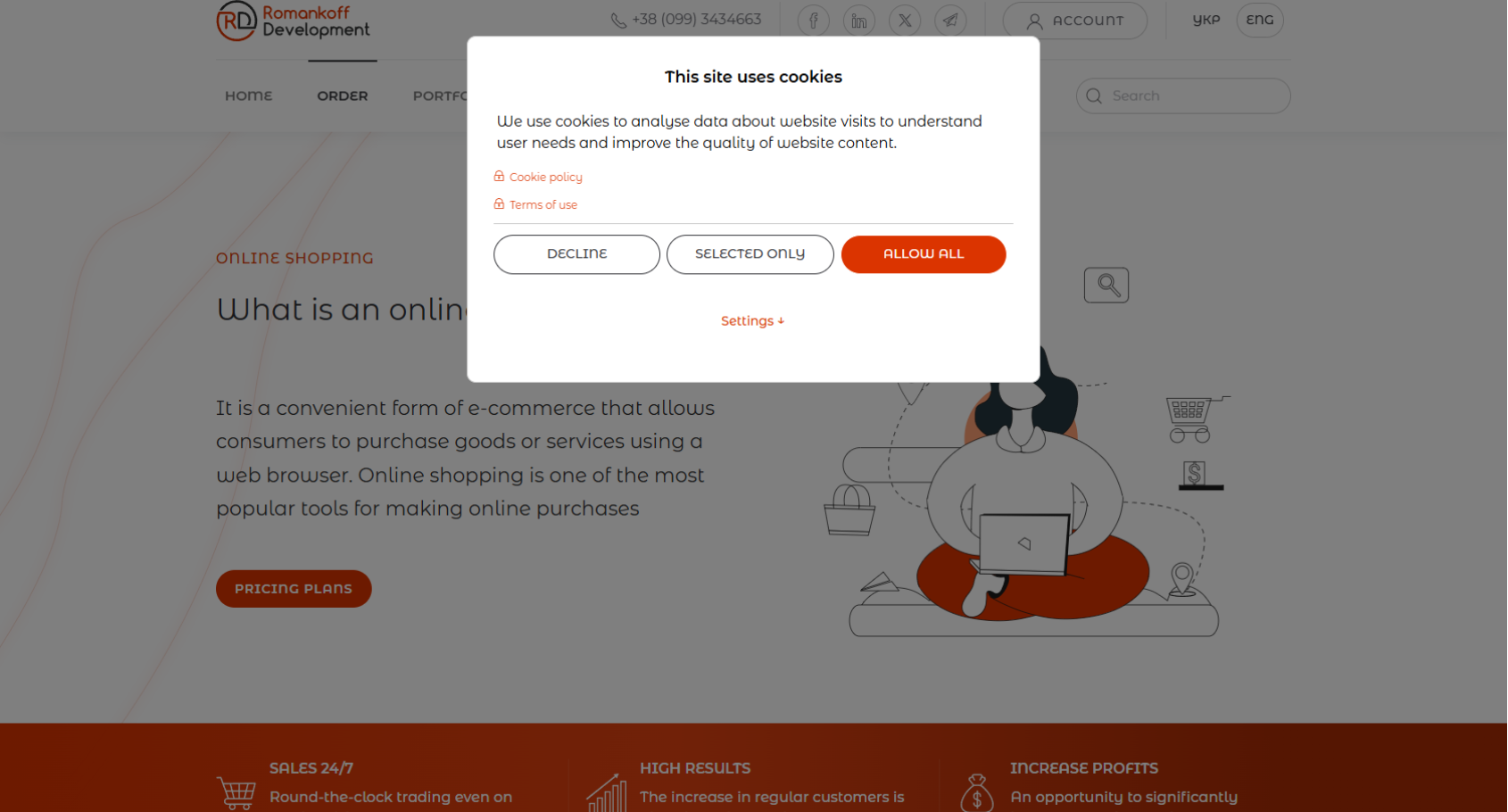
Example of a pop-up window with a cookie request
According to the GDPR:
- Websites are obliged to inform users about what cookies they use and why.
- Users must give their explicit consent (e.g., through the «Accept» button) before a website can store cookies on their device.
- Third-party cookies (e.g. for advertising) require specific consent.
If a website does not follow these rules, it can be fined huge amounts of money. Therefore, many sites now provide detailed cookie settings where you can choose which ones to allow.
2. The ePrivacy Act
This law complements the GDPR and focuses specifically on electronic communications, including cookies. It establishes that:
- Cookies can only be used with the user's consent.
- The only exceptions are those cookies that are necessary for the operation of the site (for example, for the shopping cart or authorization).
3. CCPA (California Consumer Privacy Act)
The US has another law, the CCPA, which protects the rights of California residents. Although it is less strict than the GDPR, it also requires websites to provide users with the opportunity to opt out of data collection through cookies. For example, many websites add a «Do Not Sell My Personal Information» button.
4. What it means for you?
If you are just an Internet user, these laws work in your favor. They give you more control over your data and allow you to decide what information sites can collect.
If you are creating a website, it is important to keep the following in mind:
- Ensure that your website is compliant with the law (e.g., GDPR or CCPA) if you work with an international audience.
- Add a pop-up window asking for consent to use cookies.
- Provide users with the ability to manage cookie settings (for example, through a special section in the site settings).
5. How to find out which cookies the site uses?
Many websites now publish a cookie policy, a document that details what files are used and why. You can usually find it at the bottom of the site. This is useful if you want to understand how the site collects and uses your data.
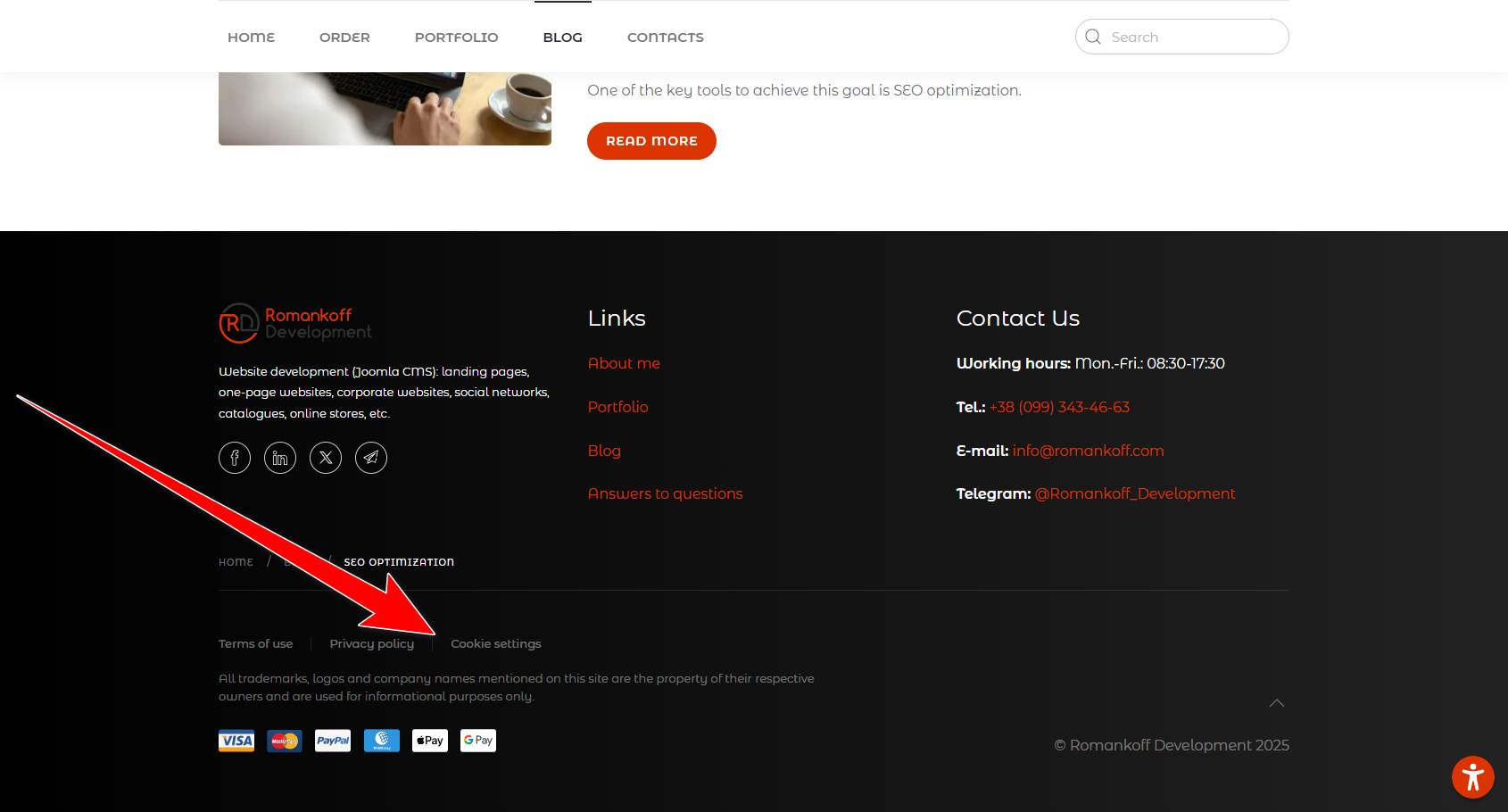
Example of placing a link to the cookie policy in the footer of a website
Cookie legislation helps protect our privacy, but it also requires us to pay a little more attention to the details. If you keep track of which cookies you allow and use the management tools available, you can feel more confident and secure online.
Frequently asked questions
- Are cookies harmful?
No, cookies are not harmful in themselves. They simply store information that helps websites work more conveniently. However, some cookies (especially third-party cookies) can be used to collect data about you without your consent. To avoid problems, manage your cookie settings and use tools to block unwanted files.
- Can I disable cookies completely?
Yes, you can. However, this may result in many sites not working properly. For example, you may not be able to stay logged in or save your settings. It's best to allow only the necessary cookies and block the ones you don't need.
- How can I find out which cookies are used on the website?
You can check the site's cookie policy, which is usually located at the bottom of the page. You can also use browser tools or extensions such as Ghostery to see which cookies are loaded on a particular page.
- What if I don't want websites to «remember» me?
- Use privacy mode in the browser (in this mode, cookies are deleted after closing the window).
- Install an extension to block cookies.
- Set your browser to automatically delete cookies after the end of the session.
- Why do websites ask for consent to use cookies?
This is a legal requirement, especially in the European Union (GDPR) and California (CCPA). Sites are required to inform users about the data they collect and obtain explicit consent before using cookies.
- Can cookies steal my personal data?
Cookies themselves do not contain personal information such as passwords or bank card numbers. However, if attackers gain access to your cookies (for example, through an insecure connection), they can use them to access your accounts. Therefore, always use HTTPS websites and delete cookies regularly.
- Why do you need advertising cookies?
Advertising cookies help websites show you relevant ads. For example, if you were looking for a new smartphone, you might see ads for that smartphone on other websites. This is convenient for businesses, but can sometimes be intrusive for users.
- What is a «cookie banner»?
This is a pop-up window that you see when you visit a website. It informs you about the cookies used by the site and asks for your consent. You can usually accept all cookies or set them manually.
Conclusion
We've covered everything you need to know about cookies: what they are, how they work, what types they are, and why they are needed at all. Now you understand that cookies are not scary «spies» but useful assistants that make the Internet more convenient. However, it's important to remember that you need to be careful with their use, especially when it comes to privacy.
If you want to control your data, check your browser settings regularly, delete unnecessary cookies, and use tools to block third-party files. And if you're building a website, don't forget to comply with legislation such as the GDPR or CCPA to protect the rights of your users.
I hope this article helped you understand the topic of cookies and answered all your questions. If something is still unclear or you want to know more, write in the comments! Also, subscribe to my blog so you don't miss new articles about web development and technology!
Comments: 0
Only logged in users can comment